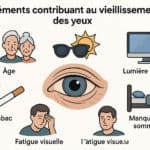Red eyes are a common problem that can have several causes. Here are some of the most common reasons for red eyes:
Conjunctivitis: this is an inflammation of the membrane that covers the white of the eye and the inside of the eyelids. It may be due to an infection (bacterial, viral or parasitic), an allergy or irritation. Conjunctivitis manifests itself as red, watery, itchy or sticky eyes. It is generally treated with eye drops or eye ointments1.
Subconjunctival hemorrhage: this is bleeding under the conjunctiva, which gives a bright red appearance to the eye. It can be caused by trauma, coughing, sneezing, high blood pressure or taking anticoagulants. Subconjunctival hemorrhage is generally benign and resolves spontaneously within a few days1.
Eye fatigue and visual impairment: working on a screen, reading for long periods of time, lack of sleep or wearing contact lenses can tire the eyes and cause redness. It is important to take regular breaks, blink, hydrate well and consult an ophthalmologist if visual correction is needed.
Lenses, infection and trauma: Wearing contact lenses can irritate the eyes and encourage infections if they are not properly cared for or worn for too long. Foreign objects, chemicals or blows can also injure the eye and cause redness. It is then necessary to remove the lenses or foreign bodies, rinse the eye with water or physiological serum and consult a doctor in the event of pain, loss of vision or signs of infection.
Acute glaucoma: this is a sudden increase in pressure inside the eye, which compresses the optic nerve and threatens vision. Acute glaucoma manifests itself as a red, very painful eye, hard as a stone, with blurred vision and halos around the lights. This is an ophthalmological emergency that requires immediate treatment to prevent blindness4.
If you have red eyes, it is advisable to consult a doctor if the redness persists for more than 48 hours, if it is accompanied by other some symptoms or if it affects only one eye. There are decongestant eye drops that can temporarily relieve red eyes, but they should not bes accompanied by other bothersome symptoms or if it affects only one eye. There are decongestant eye drops that can temporarily relieve red eyes, but they should not be used without medical advice as they may mask a more serious cause or cause side effects.
we advise different types of treatment depending on the causes
the first is the consultation with the ophthalmologist


